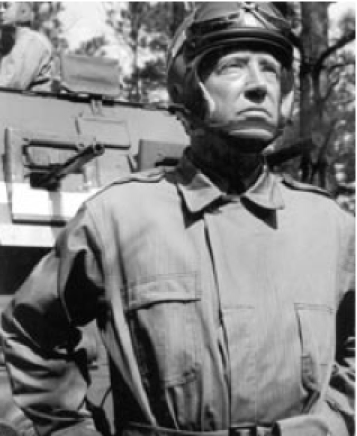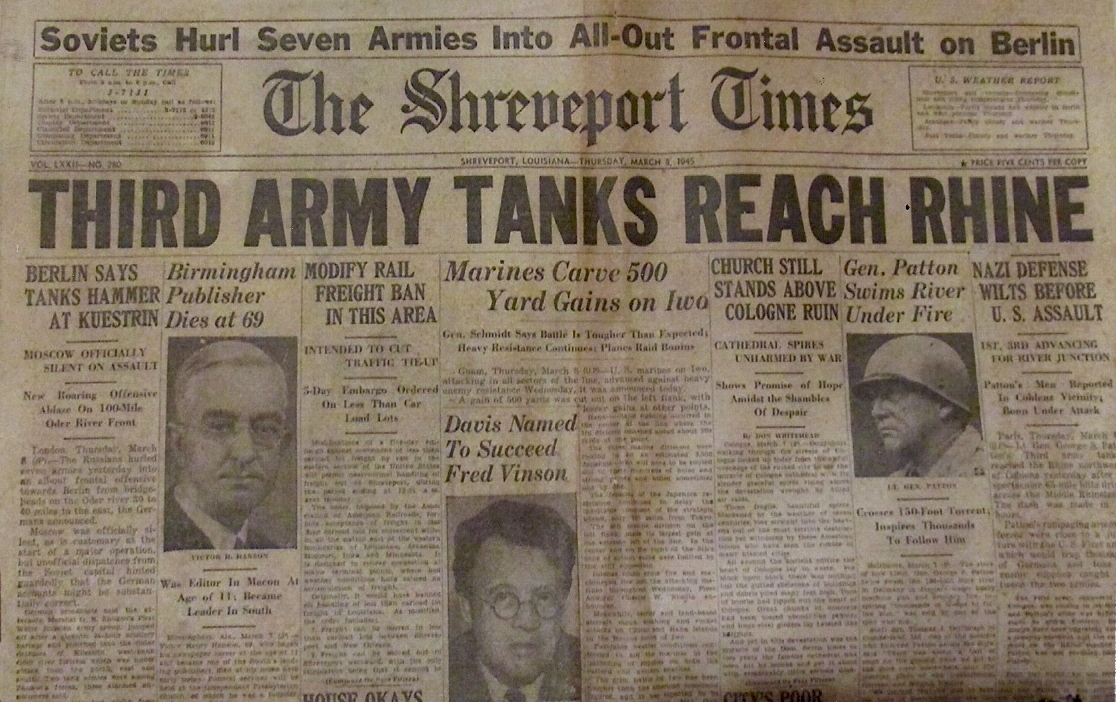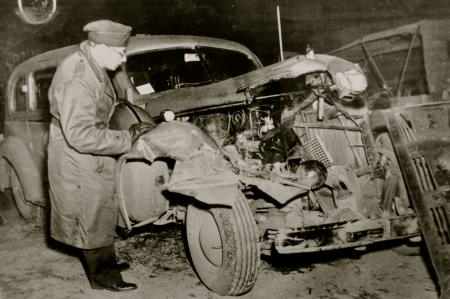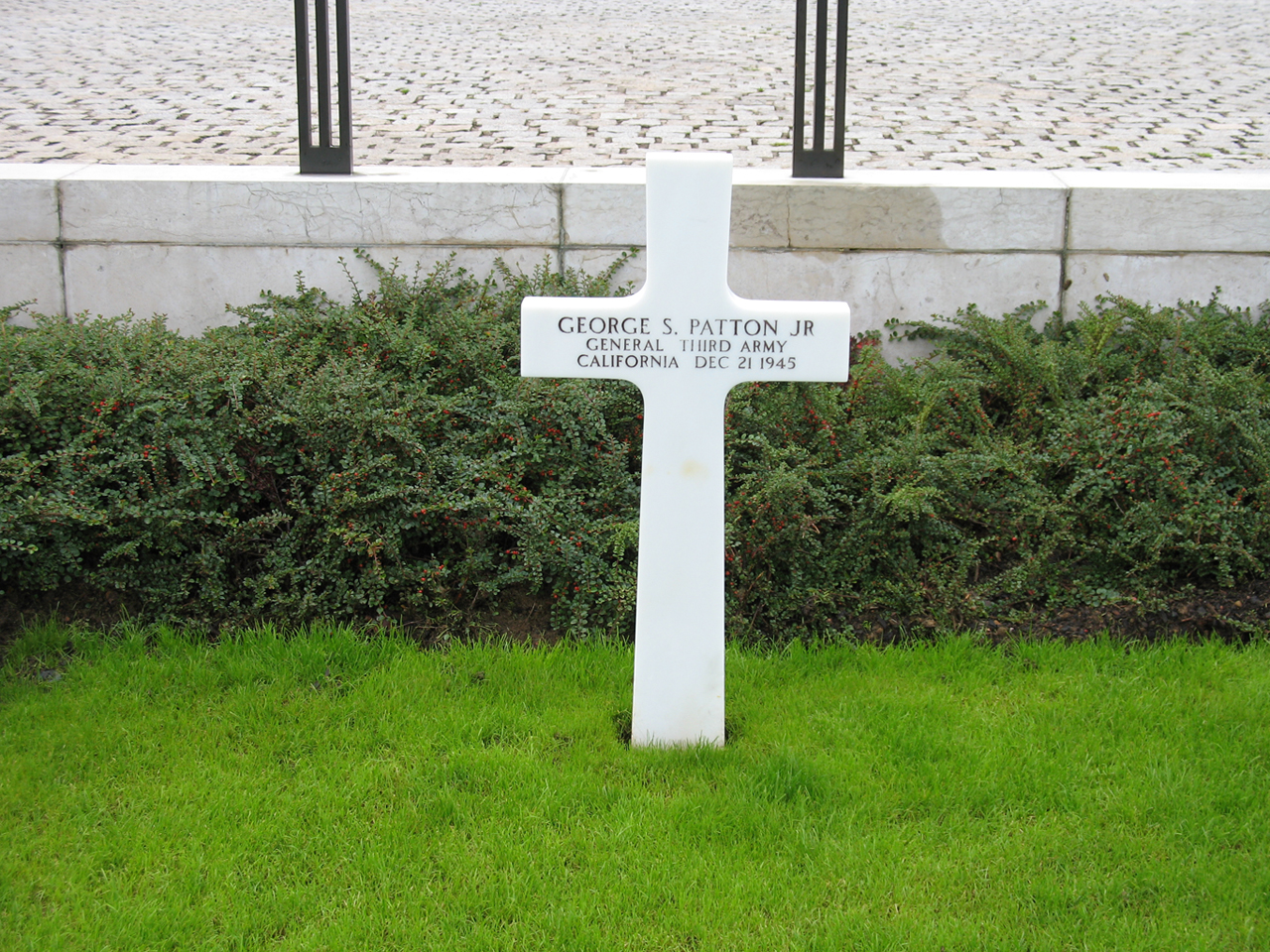GENERAL PATTON IN LOUISIANA 1941
BY RICKEY ROBERTSON
During the Louisiana Maneuvers of 1941 there were many officers who had careers that began to shine. One of these officers was General George S. Patton Jr. George Patton was born November 11, 1885 in California to a very privileged family. The military was part of his ancestry. His paternal grandfather, George Smith Patton was the commander of the 22nd Virginia Infantry in the Confederate Army and was killed in action at the third Battle of Winchester, and his great uncle Waller T. Patton was killed in Pickett's Charge at the Battle of Gettysburg. Patton first attended Virginia Military Institute (VMI) and later went to the U.S. Military Academy at West Point where he graduated in the Class of 1909. After graduation he participated in the 1912 Olympics and in 1916 he was part of the U.S. Army Expedition chasing Pancho Villa into Mexico. During World War I Patton trained and led the very first American tank units in France, where he was wounded in action. Between World War I and World War II Patton worked hard in developing armored warfare doctrine and tactics and armored vehicles. By the time of the Louisiana Maneuvers in 1941 he had reached the rank of Major General and was in command of the 2nd Armored Division. And when he left Louisiana he left many memories and stories with the local folks that began his legend .
When the first phase of the Louisiana Maneuvers began on September 15, 1941, General Patton and the 2nd Armored were assigned to the Red Army. On day one his tank units crossed the Red River near Montgomery, La. and advanced so fast they reached Ft. Jesup located near Many, La. later that day in the afternoon. Always pushing his men to advance, at Ft. Jesup his units attacked a mounted cavalry section of the 1st Cavalry Division. This battle was fast and furious, with General Patton right in the midst of it. One of the 2nd Armored tanks during the heated engagement ran over and destroyed one of the historical markers at the site. He did not have time to stop because General Patton was leading the advance westward. The 2nd Armored advanced quickly toward the town of Many, La. where at the intersection of present day La. Hwy. 6 and U.S. Hwy 171 at St. John's Catholic Church they encountered a massive traffic jam. The single Military Policeman could not get the traffic unsnarled and moving again. Up drove General Patton in his command car and he jumped out and began shouting, cursing, and moving the men and vehicles. With his loud bluster, General Patton began to bring order out of the traffic chaos and the long columns of military vehicles began slowly moving south. But due to the loud cursing and obscenities the parishioners at St. John's Catholic Church had their worship service completely disturbed . The exasperated priest stopped Mass and walked outside to see what was causing this disturbance outside the church. He confronted General Patton and asked him to please lower his voice and quit his cursing as he was attempting to conduct worship services. General Patton did not argue or bicker with the priest. This may be the first time he was ever corrected! Instead he apologized and turned the traffic control duties back over to the Military Policeman. As he mounted his command car General Patton saluted the priest and headed south with his advancing tanks!
General Patton also set up accounts at many country stores in the maneuver area so that his troops could purchase needed items on credit. John Tarver had such a store at Many, La. and had agreed to this agreement. One morning General Patton arrived at the store and found two young dusty soldiers criticizing him to the store owner. They did not know the general was there and continued their railing against him. With a loud bellow, General Patton walked up, slapped the two privates on the back, and told them to keep up the good work, and to keep attacking the enemy. The two stunned soldiers rushed quickly away. Patton told Mr. Tarver he liked "such fighting spirit in his men". He said that if they were cursing him that proved he was training them well. The general then paid the division's $500.00 bill and left.
Several years ago I interviewed the late George Albritton of Robeline, La. at a Veterans Event. George was a Natchitoches Parish boy raised near Robeline, La. During the summer between his junior and senior school years, he went to work in a filling station in Leesville, La. to earn some much needed money. One Saturday during the maneuvers, George saw this big black Cadillac pull into his station with general's flags flying on the front bumper. George said a tall, extremely well dressed army officer emerged from the Cadillac and asked to use the rest room. George had just it up real good. The officer came out and wanted to know who owned and operated the station. George politely told the officer. The officer replied he was going to write the Texas Oil Company (Texaco) a commendation for he had just found the "only clean restroom in the State of Louisiana" ! He asked George to wash and lube his car, which he did. The officer paid for the vehicle maintenance and didn't say anything else when he left. The very next Saturday, guess what ? The same big black Cadillac appeared again. George by now knew who the officer was. He was General George S. Patton Jr. He asked George if he could clean his car as good as he had the previous weekend. "Yes sir I can" replied George. After he had completed the vehicle maintenance the general pulled up a chair and started to talk with the teenager. General Patton asked "son, why don't you come and be my chauffer. My driver don't have sense to go and come". George told the general that he wanted to finish high school and that he had only one year left. General Patton told him he wanted him to finish school and that when he did get out of school to join the army and tell the recruiter to send you to me, no matter where I am, and you better do it ! But you know what George did after graduation ? He joined the U.S. Marines !
General Patton's greatest achievement during the maneuvers was his "end run" that he used in capturing Shreveport and Barksdale Field during Phase II after having been placed in the Blue Army. He advanced towards Leesville and Peason Ridge against the Red Army. With the Red Army believing that he would attack due north, at Leesville and Merryville he suddenly turned west into east Texas. From Newton north his 2nd Armored rolled in its advance. All the gasoline in local rural service stations was bought up and tanks that broke down were being repaired in 30 minutes by ordnance repairmen. At Greenwood La. he turned east and came in behind Shreveport and Barksdale Field. With his 2nd Armored Division about to capture these key locations, the Louisiana Maneuvers were called to a halt. In December 1944 General Patton and other commanders in Europe were asked by General Eisenhower and his staff if they could relieve the surrounded 101st Airborne at Bastogne. Patton replied he could and he pulled his famous 3rd Army out of the line and completed an end run that broke through the German lines allowing the men of the 101st at Bastogne to be saved. His famous tactics used in Louisiana saved the day during the Battle of the Bulge.
When the war ended General Patton, a hero to some and a hated man to others, remained in Germany as military governor of Bavaria. Sadly at age 60 he died of injuries he received in an automobile accident on December 21, 1945 and he was buried in the American Cemetery in Luxembourg along with his men of the 3rd Army who had died during the war.
Several months before General Patton had dedicated this same cemetery where so many of his men had been buried. In his speech he made this prophetic statement: "It is foolish and wrong to mourn the men who died. Rather we should thank God that such men lived"! I think this describes General George Patton himself. We should be thankful that he learned his lessons here in Louisiana well because he used them to keep freedom ringing in this nation and the world and thank you General Patton for leaving us your legends and stories here in Louisiana for generations to come.

General Patton somewhere in Louisiana during the 1941 Maneuvers. (Robertson Collection)

March 8, 1945 Shreveport Times article showing General Patton's Third Army advancing against the Germans. (Robertson Collection)
.jpg)
General Patton receiving a report in the filed during the Louisiana Maneuvers of 1941. (Robertson Collection)

General Patton's automobile that was involved in the accident that took his life in 1945. (Robertson Collection)

General Patton's grave located in the American Cemetery in Luxembourg. (Robertson Collection)